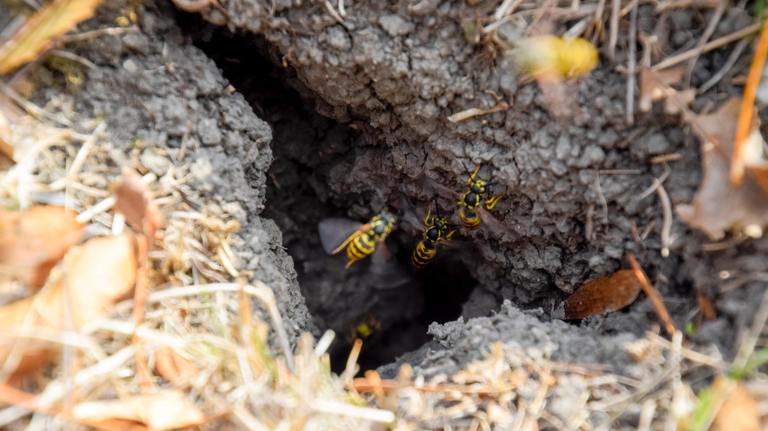Ground Hornets: Identification, Risks, and Control Strategies
Published: March 24, 2025

Ground Hornets: Hidden Dangers and How to Control Them
Ground hornets can be a significant nuisance and even a danger to homeowners and businesses. These aggressive stinging insects build their nests underground, making them difficult to detect until they pose a real threat. Understanding their behavior, risks, and effective pest control strategies is essential for anyone dealing with an infestation.
What Are They?
Also known as cicada killer wasps or large ground-dwelling wasps, are part of the wasp family and are known for their large size and potent sting. Unlike their aerial-nesting relatives, these insects prefer to establish their colonies in underground burrows, often in loose or sandy soil.
Characteristics of a Ground Hornet:
- Typically measure between 1-2 inches in length
- Black or brown with yellow or white markings
- Prefer dry, loose soil for nesting
- Can deliver painful stings when disturbed
They're often confused with yellow jackets, but they are distinct in their nesting habits and behaviors. Unlike yellow jackets, which build paper nests, ground hornets excavate soil to create underground chambers where they rear their young.
The Risks of a Ground Hornet Infestation
They can pose significant dangers to both humans and pets. Their sting is not only painful but can also cause severe allergic reactions in some individuals. Unlike bees, hornets can sting multiple times, making them particularly dangerous when provoked.
Common Risks
- Aggressive Defense: They will attack if they feel their nest is threatened.
- Multiple Stings: Unlike bees, they do not lose their stinger, allowing them to sting repeatedly.
- Allergic Reactions: For individuals allergic to venom, a sting can result in anaphylaxis, a life-threatening condition.
- Structural Damage: When nesting near homes, they can disturb foundations and lawn aesthetics.
Identifying a Ground Hornet Nest
Spotting a nest early is crucial for effective pest control. Look for small mounds of loose soil with a noticeable entry hole. These nests are often found in gardens, playgrounds, and open fields. Unlike bees, ground hornets are solitary or semi-social, meaning their nests may not house large colonies, but they can still be aggressive if disturbed.

Traditional Pest Control Solutions for Ground Hornets
Dealing with them requires a professional approach to ensure safety and effectiveness. Traditional pest control methods include a combination of insecticidal treatments, nest removal, and preventative strategies.
Traditional Pest Control:
- Targeted Pesticide Applications: Professionals apply specialized pesticides to eliminate ground hornets while minimizing risks to beneficial insects.
- Nest Destruction: Safe removal and disposal of underground nests ensure hornets do not return.
- Barrier Treatments: Long-lasting insecticidal barriers around homes and high-risk areas prevent hornets from establishing new nests.
- Integrated Pest Management (IPM): A combination of monitoring, habitat modification, and chemical control ensures sustainable and effective pest elimination.
Professional Pest Control Methods:
- Insecticidal Dusts: Professionals often use specialized insecticidal dust to penetrate underground nests and eliminate the colony.
- Liquid Treatments: Certain liquid insecticides can be applied directly to the nest entrance to neutralize the threat.
- Preventative Measures: Sealing cracks, keeping lawns well-maintained, and reducing soil moisture can deter them from nesting.
Chemical Control Methods for Ground Hornets
Chemical control is an essential part of managing ground hornet infestations effectively. According to the Penn State Extension, chemical control should be used as part of an Integrated Pest Management (IPM) strategy, combining monitoring, non-chemical methods, and pesticide applications to reduce pest populations safely and effectively.
Key takeaways from Penn State Extension's Chemical Control Tactics:
- Selective Use of Pesticides: Using targeted applications minimizes impact on non-target species and the environment.
- Proper Timing: Applying pesticides at the right stage in the pest’s life cycle increases effectiveness.
- Safety Measures: Proper handling, protective equipment, and adherence to label instructions reduce risks to humans and pets.
- Long-Term Impact: Chemical treatments should be combined with preventive tactics to ensure long-term pest control.
How to Prevent Ground Hornet Infestations
Prevention is always better than dealing with a full-blown infestation. Homeowners can take several steps to make their properties less attractive to ground hornets.
Effective Prevention Tips:
- Traditional Pest Control: Traditional pest control, which includes insecticidal treatments, nest removal, and preventive strategies, is generally the most effective way to eliminate pests while reducing the chances of future infestations.
- Regular Lawn Maintenance: Keep grass trimmed and avoid overwatering to discourage hornet nesting.
- Seal Entry Points: Close cracks and gaps in patios, decks, and foundations.
- Remove Food Sources: Eliminate exposed garbage and sweet-smelling attractants.

When to Call a Pest Control Professional
If you suspect a ground hornet infestation on your property, it's best to call a pest control expert. Attempting to remove a nest on your own can be dangerous and lead to aggressive attacks. Professional pest control services have the experience, protective gear, and specialized treatments necessary to eliminate the problem safely and efficiently.
Why Choose Professional Pest Control?
- Safe and Effective Treatments
- Expert Knowledge of Wasp Behavior
- Preventative Advice for Future Infestations
- Guaranteed Results
Conclusion
Ground hornets can be a formidable pest, but with the right knowledge and professional pest control solutions, they can be managed effectively. By understanding their behavior, risks, and control methods, homeowners can protect their families and properties from these aggressive insects. If you suspect an infestation, don’t hesitate to contact a pest control specialist for a safe and permanent solution.
For more information or to schedule an inspection, visit our pest control service page today!